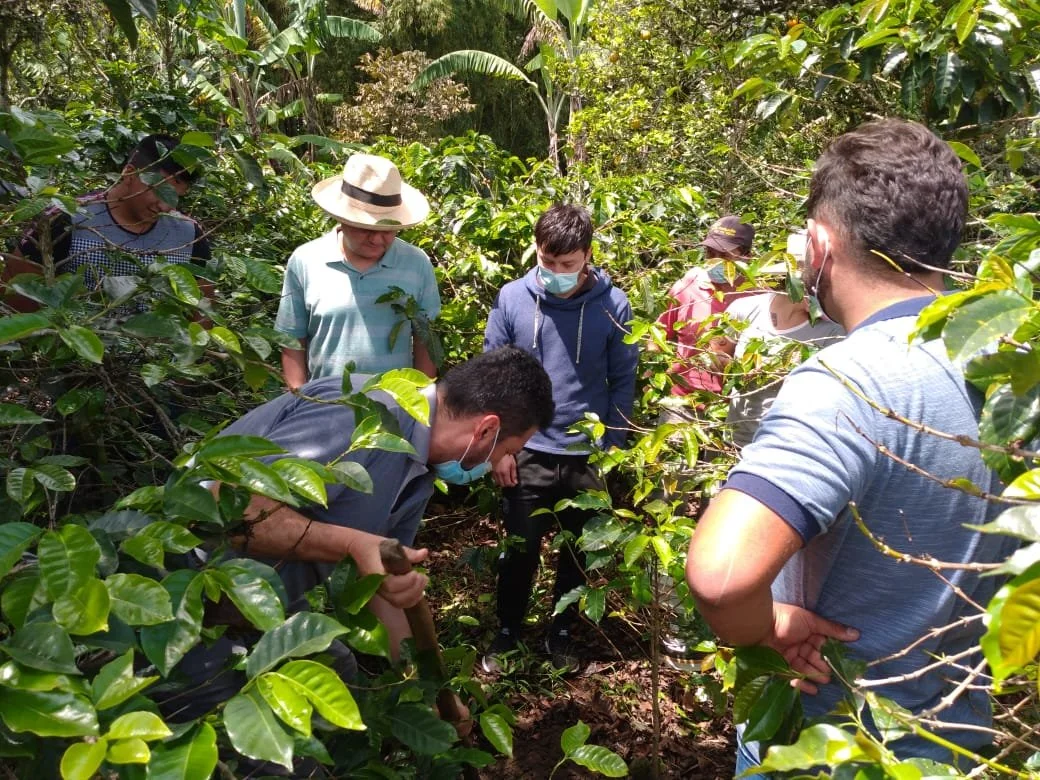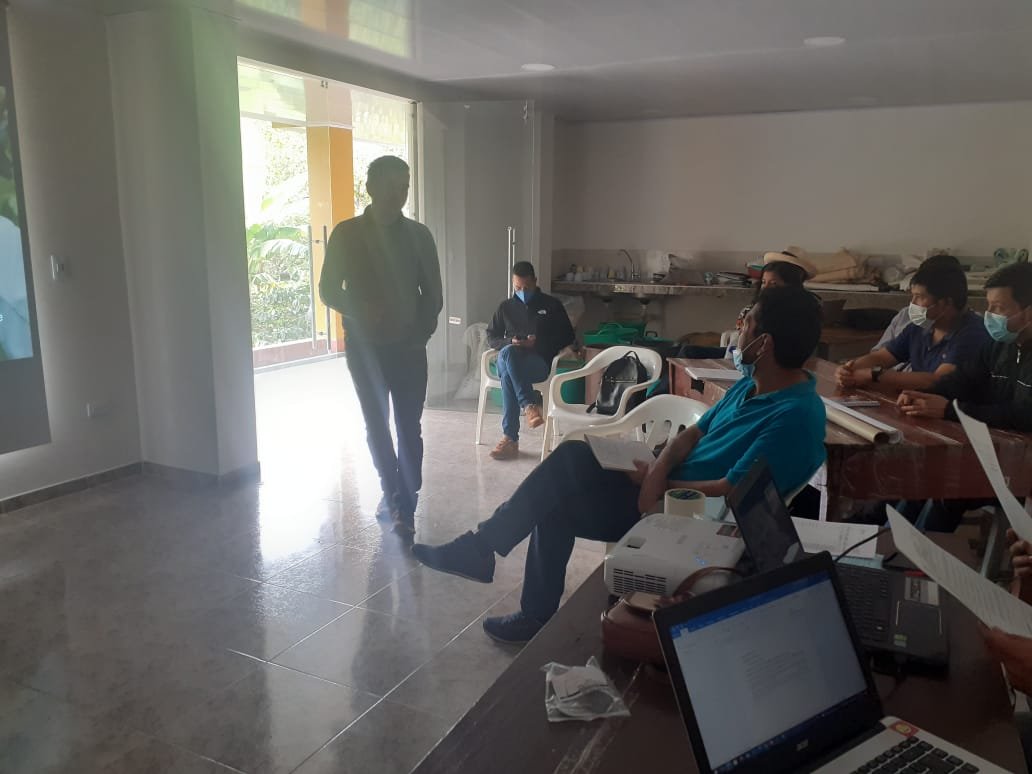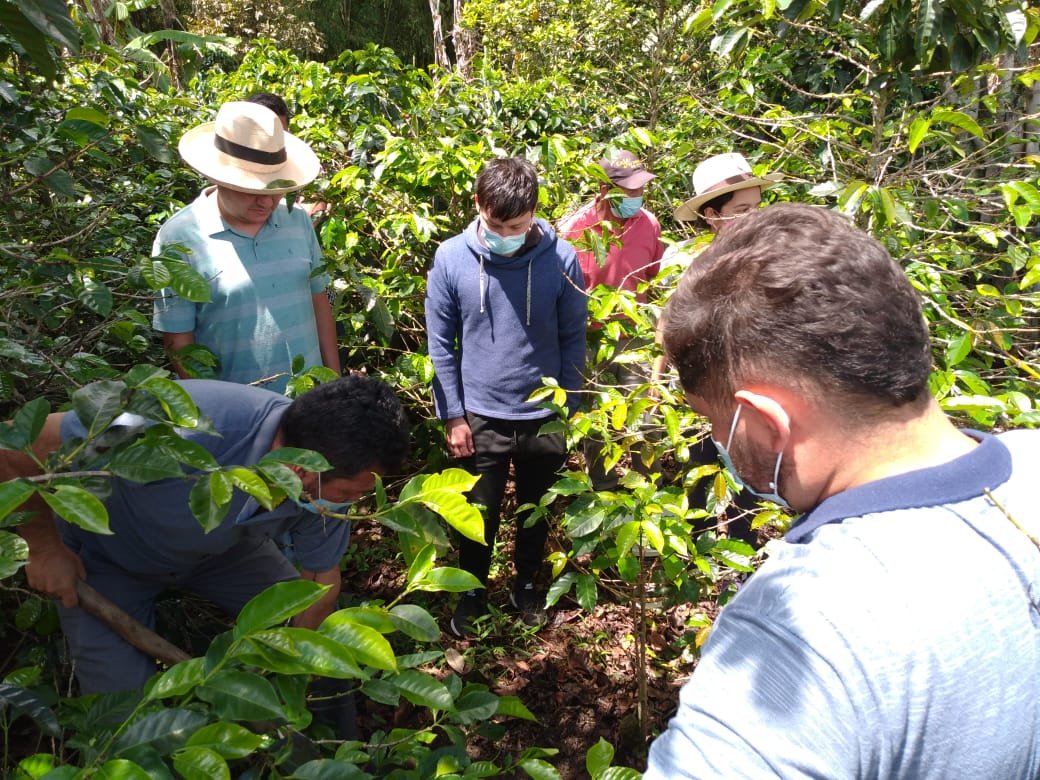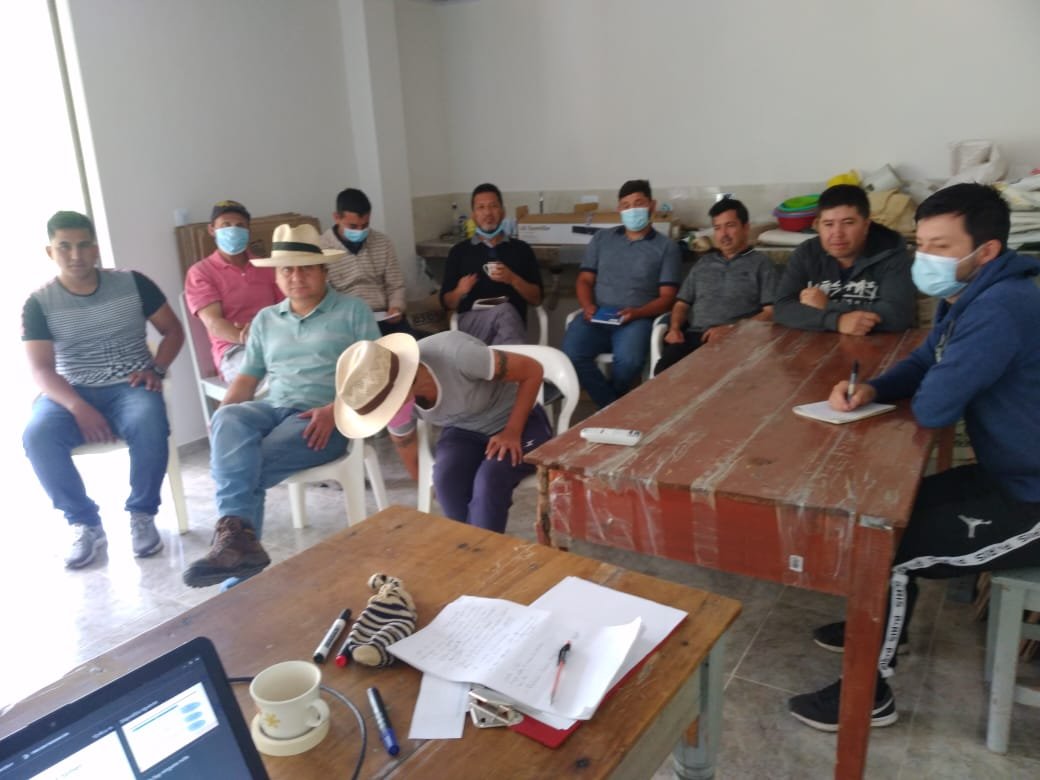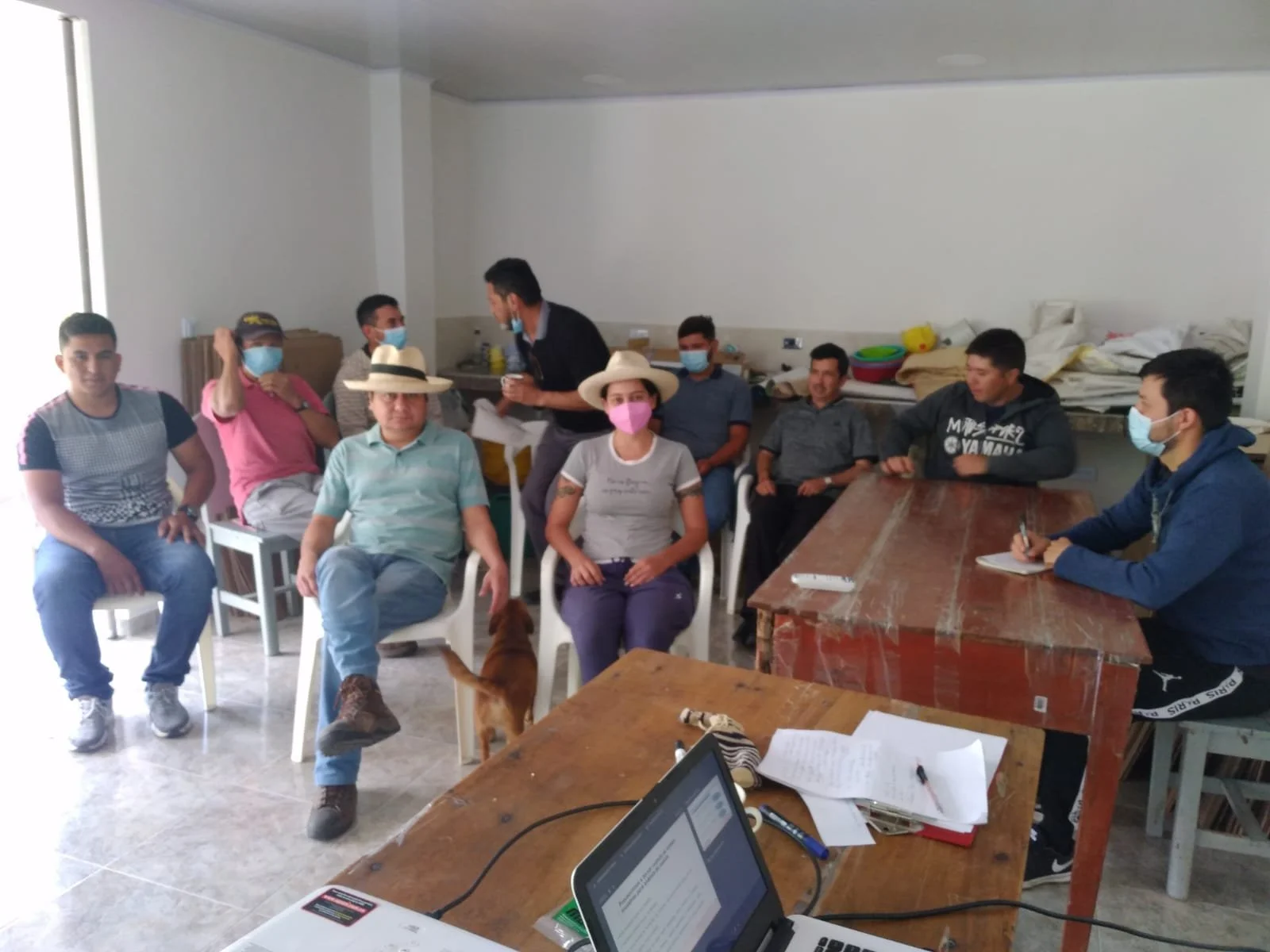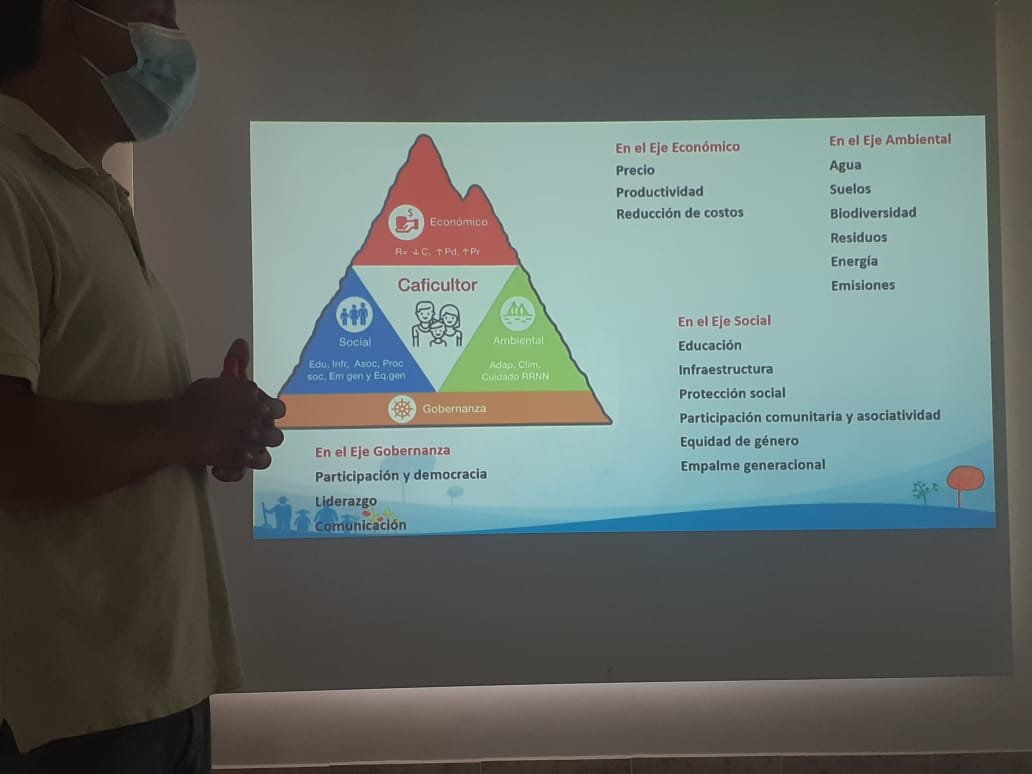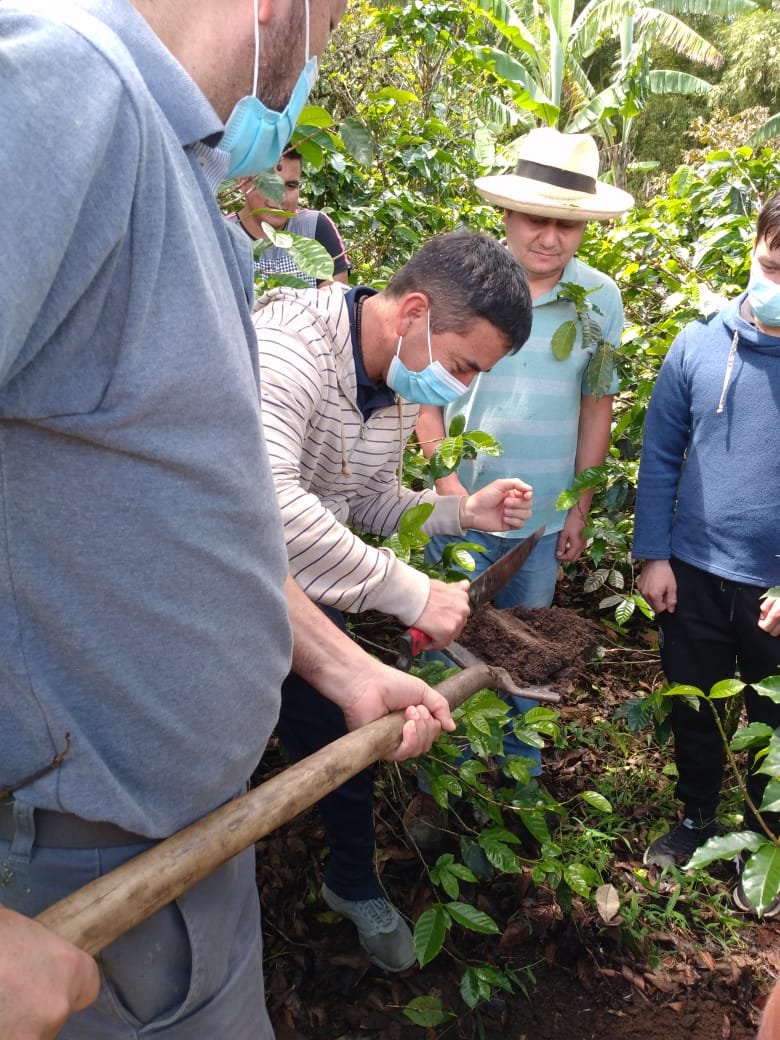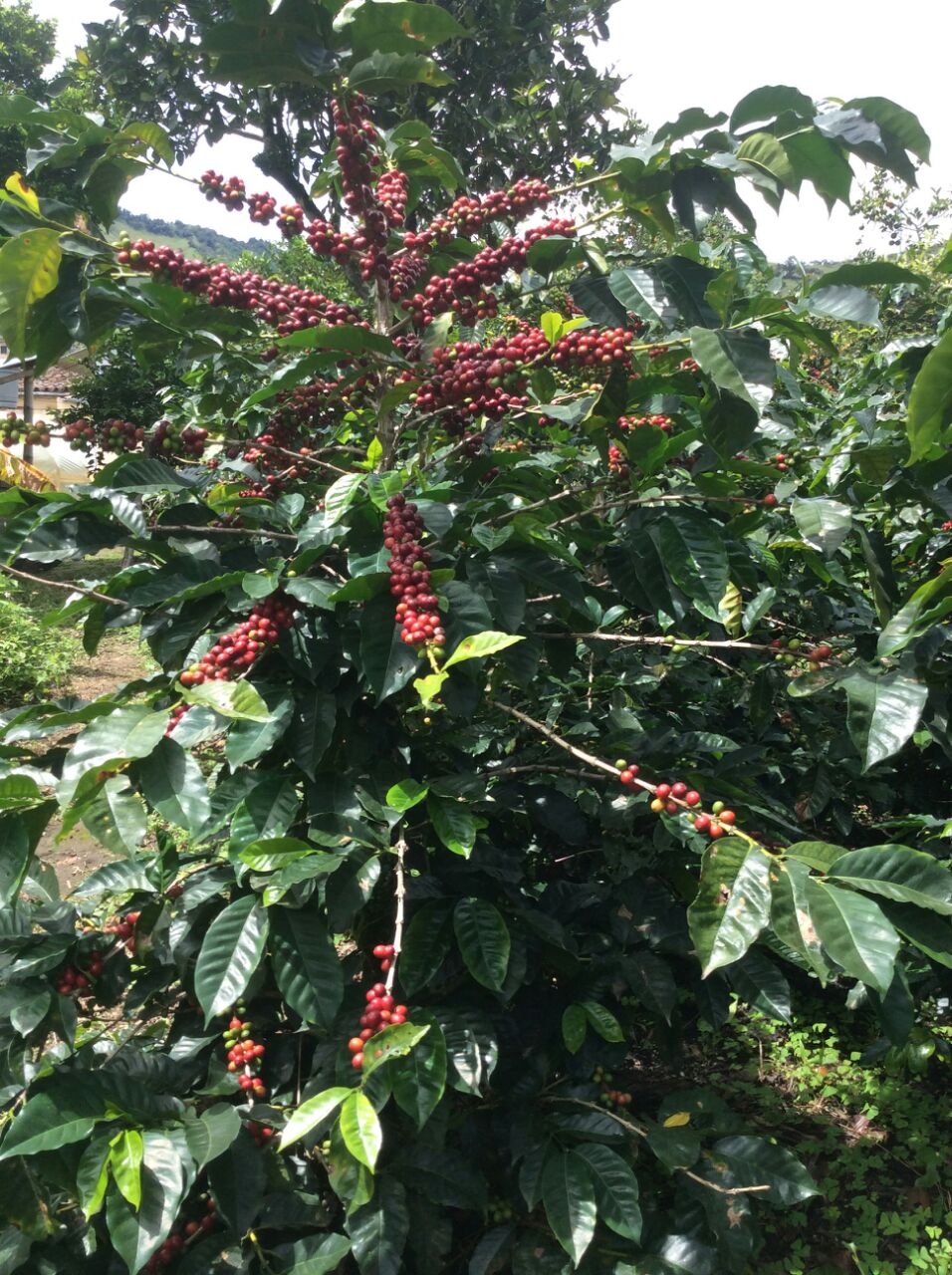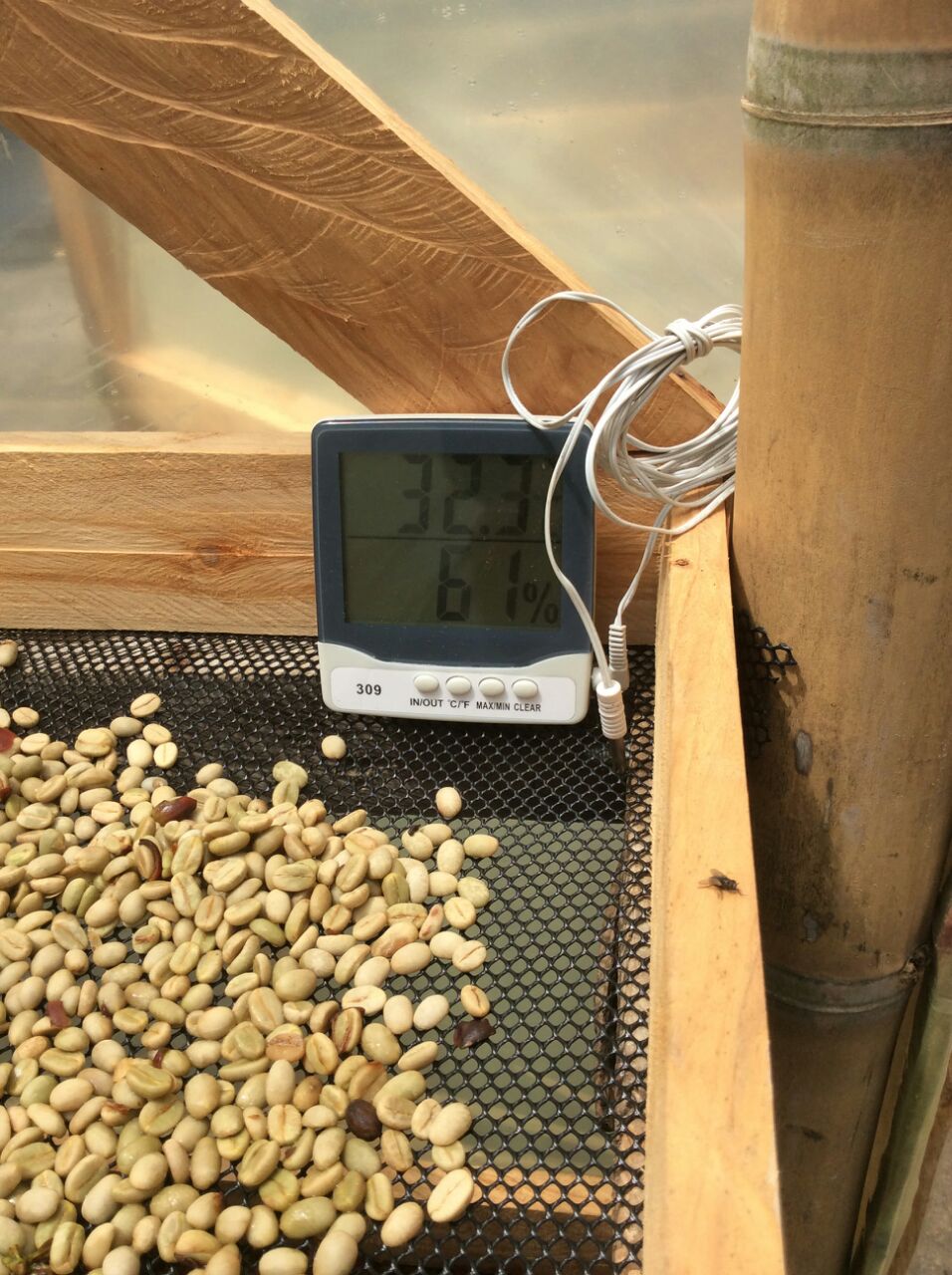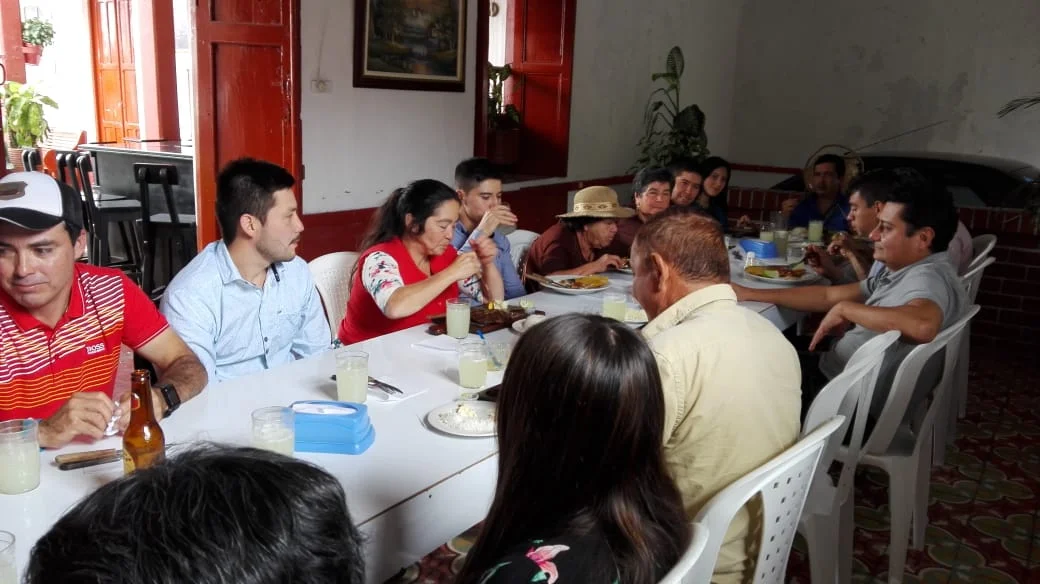Converting the whole village
What would happen if we did something different with our coffee? wondered Juan Pablo just when his father, Efraín, was about to sell the estate. What would happen if I moved back to the field? thought Juan Pablo who was then living in the city, like the rest of his brothers. Father and son started processing and roasting their own coffee, selling it locally. In 2014, Lennart met Juan Pablo through a mutual friend. They hit it off immediately and a partnership was born. In the first year, we helped them obtain hulling equipment and an export license so they could sell this coffee straight to us.
Less than two years later, they became independent exporters, created raised beds, helped their friends of the Muñoz family process and export their crop, and already seven groups of field baristas have helped to experiment with cascara, honey, natural, anaerobic processing, and much, much more. Since 2016 the washed crop was fermented, a great tweak that has made the coffee's sweetness more layered. In 2017 we began experimenting and upgrading with greater pace and in direct cooperation with roasters. 2018 brought about the first structural fermentation timing experiments, while in 2019 many of the farmers have spent their premiums on not just raised beds but raised drying “drawers” for maximum space efficiency. 2020 and 2021 saw the establishment of a training center for regenerative transition for any farmer who is interested. In 2022 the processing craziness continued and plans to start cacao production arose.
Today, not a farmer in the village of Génova is untouched by the influence of the regenerative, organic and direct trade messages that the Argote project has been sending out. With a mentality and a network like theirs, the sky truly is the limit.
-
Many in the coffee world have come across the name “Nariño” at some point, perhaps most famously from the fact that Starbucks sells it as a single origin offer. Nowadays there isn’t a village in the mountains of Nariño that doesn’t have sign of a (supposed) campaign running from some big coffee companies like Starbucks and Nespresso. But ever since the rise of the Third Wave and direct trade relationships, other regions such as Huila and Medellín have stolen some of Nariño’s thunder. Apart from a few notable exceptions like the efforts of the Borderlands Coffee Project to promote the region to American direct traders, the old coffee buying model still provides most of the region’s sustainable income.
Take it from us, though: Nariño is still one of the main stars of Third Wave Colombian coffee and an incredible coffee origin. Rainfall, temperature, solar radiation, organic matter in the soil, and even wind conditions are all perfectly fit to entice the coffee shrub to make the best cherries possible.
Within Nariño, the altitude at which the village of Colón is situated is perhaps this coffee’s most unique feature: On the one hand, the shape of the mountains here allows the warm, moist winds from the valley to blow upwards at night, which makes coffee cultivation here viable at altitudes that elsewhere would kill the fragile shrubs. On the other hand, cold trade winds from the south find their way to this region. This interchange of cold and warm influence makes temperatures here fluctuate between 7 and 30 degrees Celsius, forcing the coffee to hold on to and trigger the production of more sugars, the solubles responsible for the acidity of the coffee. These dreamlike conditions are unlike we’ve ever seen anywhere in the world, and are what gives this coffee its beautiful acidities, smooth mouthfeel, and pronounced aromas.
Juan Pablo, our partner and second son of the Argote family, knew there was more to be gained from Nariño’s unique coffee. He grew up in the village of Colón Genova and has been working with coffee since he was a child. He now roasts coffee under his brand “Sol del Venado” to the local market for extra income but understood that his family’s coffee had the potential to be sold green to foreign buyers - if only he could find them...
As with most of This Side Up’s partners, this one came to us serendipitously through an introduction from a friend of both Lennart and Juan Pablo. On an exploratory trip to Colombia in 2014 with friend and serial entrepreneur Fraser Doherty, we decided to have one last stop in Nariño to meet Juan Pablo and fellow coffee grower Hernando Gutierrez. We cupped several coffees and were blown away by how they compared to everything else we tasted on our trip. Of these coffees, Juan Pablo’s took a slight lead over the others, so we were anxious to see where it was grown.
After a six-hour drive, we arrived in the secluded village of Colón Genova, a 100-year old coffee-growing settlement on the border of the departments of Nariño and Cauca. The next days we spent in the family house and learned with how much care the entire family treated picking, sorting, and processing of the coffee. True to Colombian hospitality standards, we too were treated as family and showed around the farm and village by Juan Pablo and his father Efrain. We met other growers and talked about the needs of the community. We learned that Colón was largely left untouched by development programs, save the standard training programs of the FNC.
The example of Colón Genova shows just how greatly one can impact a community by buying coffee straight from smallholder farms. We calculated that if five containers of the village's specialty coffee could be sold through direct channels, there would be enough money to provide adequate food supplies, health care, and education for everyone there. It didn’t take long before we started discussing how we could work together to reach these goals in the years to come. The first step was to upgrade their processing standards and export their 2015 crop to Europe.
When we left Nariño, a partnership was born - and we have been in touch with Juan Pablo at least weekly ever since to talk about quality upgrading, export licensing, and a thousand other things. In May 2015, we financed 50% of the hulling machine that has allowed full processing to be in the hands of the Argote family, and in the autumn months we worked out all the bureaucratic details of how to export this coffee with the help of Hernando.
The coffee has now arrived and surpasses all expectations: it is even more floral and bright than what we cupped. It is safe to say that this is the best bet This Side Up has ever made. The coffee is now almost sold out and we are preparing for the new harvest. Juan Pablo has been taking specialty coffee growing/cupping courses and decided that this year's premium will go towards building raised beds instead of the patio they now use, as well as upgrading all washing processes to 1) allow fewer defects to create a cleaner cup, and 2) be able to efficiently process more of the village's coffee - eventually even all of it. In Juan Pablo's own words in a Facebook chat: "my goal is not to make myself rich but to share the profits of our quality with as many growers as we can. It´s my dream that one day we can make all of Genova´s growers participate in the exportation process and have a unique quality standard."
It's our dream to be working with someone who thinks like this!
Every one of our 35 kg bags from Argote shows the name of the farmer.
However many lots in the Argote community taste very similar - so we grouped them into three “Lines” to help you choose the right one for yourself.
Line 1: PÚLPITO
Our Pulpito lot is an all-round typical chocolaty Colombian coffee with medium body and malic acidity.
A great “entrance” to Colombian flavours and great for espresso.
The 2023-2024 Púlpito line is provided by these farmers.
LEO
Muñoz
hectares: 2,2
trees: 8.000
Fredi
Muñoz
hectares: 0,75
trees: 3.500
Marcel
Ordoñez
hectares: 2,1
trees: 10.000
Carmela
Muñoz
hectares: 3,2
trees: 8.000
Eider
Muñoz
hectares: 0,5
trees: 1.900
Alvaro Cerón
hectares:
trees: 2000
Line 2: NARANJA
The Naranja lot is our middle-of-the-line lot: it exhibits recognisable Nariño flavours, chocolate,
some dried fruits and citric acidity. Crisp and clean medium-bodied espresso or thick filter.
The 2023-2024 Naranja line is provided by these farmers.
Jesús
CeRóN
hectares: 2,2
trees: 10.000
MaRIA
ArGOTE
hectares: 2
trees: 5.000
ASENcIO
Muñoz
hectares: 1,1
trees: 5.000
GeRARDO
Muñoz
hectares: 1,5
trees: 6.000
benedo lópez
hectares:
trees: 3000
Jesús Alberto Cerón
hectares: trees: 400
Line 3: MORADO
Morado is our high end lot. Juicy, clean and good complexity and vibrant acidity.
This is a coffee that deserves to be roasted lighter as it “unpacks” ever more layers as it cools.
The 2023-2024 Morado line is provided by these farmers..
sandro
CERÓN
bernardo
Cerón
trees: 600
Yuli Urbano
These are the 2023-2024 single farmer lots.
Some farmers’ coffees do not fit neatly into the three lines, usually because of different processing like natural or anaerobic experimentation,
but sometimes just because of excellence in processing.
ADIELA
ARGOTE
hectares: 3
trees: 10.000
Ibeth
Muñoz
hectares: 1
trees: 3.500
JHON
Muñoz
hectares: 3
trees: 700
JHOAN
CERÓN
hectares: 0,25
trees: 500
MAURICIO BOLAÑOS
hectares: 1,2
trees: 6.000
TRACEABILITY
You can find all the signed contracts and shipping documents that we made with Argote since 2021 below (Google Drive).
2015: Used our premium to finance 50% of a new hulling machine to allow direct export, first-ever export of Argote family's coffee, obtained independent exporter license.
2016: built covered and raised drying beds, from TSU premium installed fermentation tanks, hosted first-ever Field Barista Project, created first honey and natural tests, exported the first cascara, helped Muñoz Diaz family process and export their micro lot.
2017: created individual farmer lots and rewarded the best ones with a $1 p/kg premium; initiated first organic fertilizer trials; created three experimental fermentation lots (30, 42, and 66 hours) in cooperation with Jelle van Rossum. Juan Pablo travelled to Holland to meet his clients for the first time.
2018: 3 more farmers trained and added to the producer base. Nursery created and SL28 planted. First direct export to a roaster. Names of all producers printed on the bags. Cascara quality control protocols developed.
2019: Anaerobic processes from previous season tested, roasting equipment bought at the farm, fermentation times structurally adapted, first large natural lots created, around 40% of the harvest sold directly to and in cooperation with roasters. Rebuilt part of the drying setup in a drawer form, inspired by a local monastery that also processes coffee.
2020: Construction started on a regenerative training center in the center of Génova for farmers to learn about composting, intercropping, mulching, microbial fertilisers, as means towards becoming independent of industrial inputs..
2021: Death of Efrain, Juan Pablo’s father and esteemed leader in the village. Juan Pablo, Juan Pablo’s sister and Jésus stepped in his footsteps and help create continuity after the passing of such a trusted figure in the Argote project.
2022: Regenerative Training center in full use, Juan Pablo followed fermentation courses to create even quirkier experiments tailor-made to high end specialty roasters’ needs. First Field Barista Project since 2019 and largest ever.
2023: Regenerative premium used to invite the world famous Colombian regenerative guru and founder of "La Mierda de Vaca” to Génova for a course on composting and creating fertilisers using yeasts, bacteria and other home-made cultures.
CULTIVARS
Castillo, Caturra, some Catuaí
in nursery: SL28
Elevation
1,950 - 2,800 meters
NOTABLE
Very first specialty coffee to come out of Colón Genova in Nariño. Production, harvest, wet- and dry-milling are all done by the Argote family. Produced without pesticides, the Argote family inspects all coffee trees visually for signs of leaf rust. Transition to regenerative agroforestry on its way. Actively creating a village of specialty coffee producers.
PROCESSINg
Fully washed: hand-picked, de-pulped, washed with mountain water, fermented for 18-24 hours, sun-dried on concrete patios and on raised “drawers” with high airflow for about 2 weeks, manually sorted at the farm in four separate rounds, hulled and bagged at the Argote family farm.
Natural: Once the coffee is picked it is put it on the patio to dry in thin layers, it is turned regularly. It is covered at night or when it's raining. If the weather is good it will be ready in 4-6 weeks, otherwise it could take more than 8 weeks, drastically reducing the space available for other coffees.
Cupping notes
2024 LANDED SAMPLES
-
The price you pay for Argote Naranja line p/kg. We agreed on this price directly with the farmers, disregarding the volatile US Coffee C price.
-
Juan Pablo and rest of the farmers in the Argote ensemble earn the same farm gate price per kg of parchment which changes based on the product line. We have Naranja, Pulpito, Morado, processed coffees (fermentation, washed), naturals, bourbon as main categories. Farmers produce one or more of these based on their skills, resources available. Other farm gates are as follows :
Naturals : € 9,64
Process : € 8,27
Pulpito : € 6,18
Morado : € 6,18
Pink Bourbon : € 8,27 -
Argote buys parchment from their farmers and incurs the cost to mill, sort the coffees to specialty grade. Other costs borne by Argote include printing and packing grain pro bags, exporter charges for sorting, shipping the coffees to the Netherlands. Other farm gates are as follows :
Naturals : € 1,61
Process : € 3,03
Pulpito : € 1,05
Morado : € 1,69
Pink Bourbon : € 3,03 -
International shipping from port of Buenaventura, Colombia to Rotterdam, Netherlands. It is inclusive of customs, insurance and warehousing costs. This is specific to the sea-freight costs.
-
Average financing cost owed to (mostly social) lenders. This ensures immediate payment to the farmers when the coffee leaves the farm or port. This includes customs, insurance, storage, taxes and finding financing for the coffee.
-
A standard TSU premium on all coffees designated exclusively to accelerate farmers’ own regenerative agriculture projects. They have so far set up a field Barista project and an agroforestry hub.
-
This Side Up compensation for spending time and resources importing this coffee. Our work includes year-round contact with producers, managing export, shipping, import, warehousing, grading, sampling, finding and keeping roasting partners for Argote. € 1,22 is This Side Up’s Model 1 markup. For a full overview of our modular margin construction, see the Trade Models page.
Our QC’s Flavour impressions
Srong commitment from both sides has made this harvest a big step up from last years: Colombia has become one of the most broad flavour offers we have available at the moment. And to let you navigate easier through its diversity we introduced “lines” based on flavour profile. From grounded and basic Pulpito with notes of melon and black tea, to more playful Naranja with red apples and chocolate sweetness and as the most complex berry and stone fruit-like cups - Morado line. However Colombian offer goes further to single farmer washed lots, naturals and alcoholic fermentation profiles. This rainbow of flavours starts from balanced fruity cups with malic acidity, expands through natural processing to tropical smoothie and finds its culmination in alcoholic profiles that makes the cup truly funky.
Small tip from my end: if you are searching for more specific varieties (like pink bourbon) or processing (koji maybe?) - shoot us a message. These lots nearly never make it to our stock offer, but are available with a commitment from your side!
Renata Hardewijn, June 2024
Maria Argote Washed 2023-2024
Roasting Advice
No big surprises here. Our ‘Washed Colombia’ profile consistently brings the most out of our washed lots. If you are setting your own profile - watch out for your air flow at the end of the roast, as too strong settings tend to add overpowering hibiscus tea-like acidity. For both the natural and alcoholic profile we use ‘Natural Colombia’, it gets the most character of the cup while smoothing “rough” corners of processing. The washed profile for alcoholic works just as well, so we encourage you to try both. For these two processing methods shorter development time might be the key.
Colón Génova - Nariño, Colombia
PHOTO GALLERY
You may use these images freely to promote Argote among your customers.















